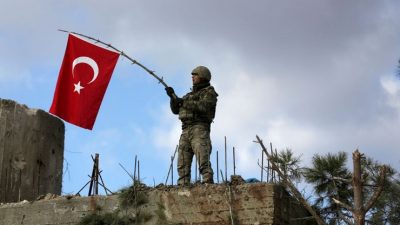Turkey Shoots Itself in the Foot by Providing Syrian “Opposition” with Advanced Weapons

The Syrian government’s offensive in northwestern provinces of Hama and Lattakia that began almost a month ago fell short of expectations. Having briefly established control over a number of areas, the Syrian army units were forced to retreat due to fierce counter-attacks by the armed opposition factions. After that the campaign transformed into a prolonged stand-off framed by sporadic clashes and mutual shelling.
The robust defense of the opposition forces is rooted into two key factors. First, the armed factions that previously existed in a state of a permanent internal struggle managed to join their ranks and reinforced the front lines with additional troops. The attacks of the Syrian army are currently being repelled by fighters of the National Liberation Front (NLF) that is considered part of the moderate opposition, members of Al Qaeda’s affiliate in Syria Hayat Tahrir Al Sham (HTS) and Uighur jihadists from Islamic Turkistan Party.
Second, the militants benefit from the use of advanced weapons, primarily ATGMs, that give them the capability to target armored vehicles from a distance and stall offensive actions of the government forces.
Since the beginning of the escalation the opposition launched dozens of ATGMs against the army units. It would appear that a lack of munitions is not a concern for them as an urgent weapons supply line was opened by Turkey.
Last week, a Turkish convoy carrying a large batch of weapons and munitions arrived at the NLF-held town of Jabal Al Zawieh. In an interview to Reuters the NLF spokesman Naji Mustafa did not deny that the group received Turkish weapons.
Besides ATGMs, the armed opposition factions were also supplied with Turkish-made Panthera F9 armored personnel carriers. Pictures posted on social media demonstrate that at least three vehicles are in possession of the opposition.
In addition to that, members of Turkey-backed factions that are normally based in northern Aleppo were recently redeployed to the front lines in northern Hama.
Despite any short-term gains, by providing the opposition forces with weapons on a large scale Turkey risks to harm its own interests in Syria.
Taking into account that during the last few years the HTS extremists have effectively established dominance over Idlib, it’s not hard to predict that Turkey-supplied weapons will end up in the group’s hands. These developments would not only hinder peaceful settlement of the situation in Idlib that Turkey is a part of, but also threaten Ankara’s ambitions of strengthening it’s influence in northern Syria. Such repercussions must come as another warning to the Turkish authorities who risk to witness internal turmoil due to their ill-advised actions abroad.
Note to readers: please click the share buttons above or below. Forward this article to your email lists. Crosspost on your blog site, internet forums. etc.
Ahmad Al Khaled is a Syrian journalist who specializes in covering foreign involvement in the Syrian conflict.
Featured image is from New Eastern Outlook

